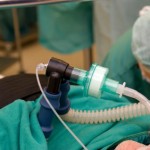For the second time, someone I know has had the misfortune to contract Guillain-Barre Syndrome, (GBS) sometimes called "ascending paralysis."
The first was a good friend who was an Air Force colonel, a former SR-71 pilot, athletic, slender and tall...he had been our Center Vice Commander when I led a small military hospital, then we kept in touch after he retired. Several years later a mutual friend called to tell me he was on a respirator in an ICU unit.
He made good progress over the next few months and eventually returned home, but with a markedly altered gait due to residual leg weakness.
That was my real-time introduction to Guillain-Barre which otherwise had been an obscure entry in a medical textbook. We saw that friend two months ago and his weakness is stable. Then two days ago I heard that a member of my men's book club, a retired professor, had the same syndrome, had been hospitalized locally and, as of yesterday, was undergoing rehab in the same facility where my wife and I have gone to for physical therapy.
GBS is an autoimmune disorder, meaning our own immune system, instead of attacking a target that is foreign to us, like a bacterium or virus, turns on us and attacks part of our body. The tissue involved varies with the disorder. Examples include Type 1 diabetes, rheumatoid arthritis, lupus and multiple sclerosis. Notice I'm not calling these illnesses as a group diseases although some are more familiar to me under that title. So what's the difference?
Some people use the terms disease, disorder and illness interchangeably. But the way I was taught, a disease has a specific cause, often an infectious one, and the body's normal function is impaired. So typhoid fever is a disease. In contrast you carry some bacteria in your bowel normally, without them causing any problems. There are certainly diseases that don't (according to our current knowledge) have a direct bacterial or viral cause; coronary artery disease would be one such.
My take on medical diagnoses that are termed disorders is they are not associated with a known infectious organism, are not communicable (certainly not all diseases are) and may have an unknown cause. The metabolic disorders, e.g., diabetes or hypothyroidism, would fit into this category.
GBS often follows a minor infection, can occur at any age, but is more likely to be seen in people who are 30 to 50 (this may be changing as more older patients have been noted in recent years)and, in most cases, the condition starts with muscle weakness in the legs which then spread upward (i.e., ascending paralysis). It can worsen very quickly, but most frequently does so over a period of days. If a patient's chest muscles and diaphragm are affected, they may need to be on a respirator.
There is no cure for GBS, but most people survive and, with appropriate medical care, eventually recover totally. In most series of patients, less than a third are left, like our former SR-71 pilot friend, with longterm weakness after three years.
There are treatments that appear to be helpful. An excellent review of GBS Rehabilitation Outcome and Recent Developments was published in a 1999 edition of the Yale Journal of Biology and Medicine. A series of 37 patients with GBS with a mean age 62 (see what I said about older patients) were followed for an extended time period. Fourteen required mechanical ventilation for 38 days (plus or minus 10), but all were eventually weaned off the ventilator successfully. None of this group of patients died, but overall mortality rates in larger series of patients have ranged from 3 to 18 %.
The clinical picture of GBS is changing and the Yale article gives lots of important concepts starting with the definition of the syndrome: a polyneuropathy (a disorder affecting multiple nerves) with an acute onset of bilateral motor weakness, absent (or severely diminished) reflexes and specific pathology features. It's the most common acute (as opposed to chronic) neuropathy in the developed world, but is still relatively rare with about four to five cases a year in a town like Fort Collins with a population of ~150,000.
Most who develop GBS have had a preceding illness or event (flu-like illness, diarrheal disease with Campylobacter being the most usual cause, upper respiratory tract infection or perhaps a vaccination (this is a hotly debated topic; the CDC review of the proposed link between vaccinations and GBS concludes there's little evidence to support a causal association with the possible exception of the 1976-77 swine flu immunization).
It's important to seek medical care early if symptoms of GBS develop; doing so may save your life.
Tags: autoimmune disorder, Guillain-Barre syndrome, immunoglobulin therapy, plasmapheresis


